North Country Girl: Chapter 37 — Latin Lovers
For more about Gay Haubner’s life in the North Country, read the other chapters in her serialized memoir.
After the fall semester finals, where I managed to squeak out a 78 in vile organic chemistry, I flew to Colorado Springs. I had hoped to do nothing but lie on the couch in my mom’s tiny apartment reading the dumbest romance novels I could find. But my Winter Break was spent prepping my anxiety-ridden mom for her upcoming Real Estate Agent exam (she was still waiting on that second marriage proposal), listening to one sister, Heidi, sob about how much she hated her school and every girl in it, and watching the other, Lani, pack her bags. She was moving back to Duluth to live with our dad. My mother mourned the loss of child support, but she would have gladly sent Lani to the moon to keep her away from her 21-year-old boyfriend. (Within six months, my dad signed some papers and Lani became a bride at sixteen.)
After two weeks of exhausting family drama, I flew back to waitressing, college, and full-on Minnesota winter, which meant no more riding my bike to and from work. I took the city bus to my job waitressing at Pracna, but the buses stopped running at midnight, forcing me to peel off my hard-earned ones for cab fare home, a cab that was always half an hour late; at one-thirty in the morning in Minneapolis there were probably all of three cabs on call.
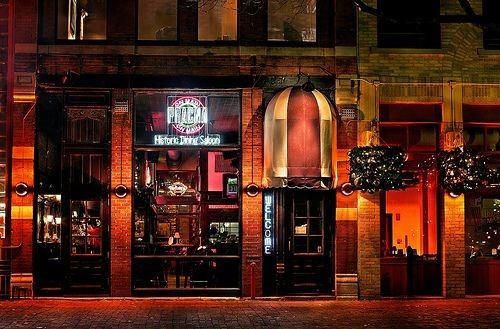

Click to Enlarge
The January days ended at 4 o’clock, when the dim grey light of winter leached away. Most twilights found me hopping from one frozen foot to the other on the icy sidewalk waiting for the bus and feeling sorry for myself.
I was ignored by my roommate Liz, since I wasn’t fun anymore. Steve, my bad boy boyfriend, stopped calling, probably busy seducing freshman girls and selling bad pills to freshman boys. I looked at my roll of ones, shrunk down to almost nothing after buying plane tickets, paying for my winter tuition, and not working for the two weeks of Christmas break, and I wallowed in self-pity.
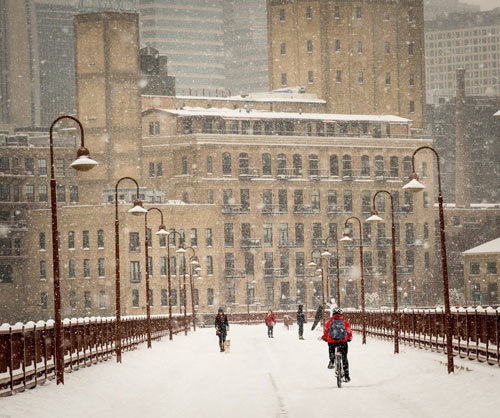
One night as I had my face pressed up against the foggy front window of Pracna, peering into the snowy frozen dark in search of my cab, I was rescued by a tap on the shoulder and a voice: “Hey you need a ride to campus?” It was Mindy, one of my favorite sister waitresses, who hustled me out to a car idling in front. Inside that toasty warm car were another Pracna waitress, Patti, and Patti’s very handsome Cuban boyfriend Eduardo, who was driving. Eduardo was at the bar almost every night, waiting for Patti and eyeing the asses of all the waitresses as we swerved around the tables. Mindy was smart, funny, and curvy, with dark, thick-lashed eyes and patent leather black hair. Her best friend Patti was a pretty, pale, flame-haired skinny girl, Lucy to Eduardo’s Ricky Ricardo.
Accepting the ride was not the bad decision. The bad decision was saying “Yeah, I guess so, for a minute” when asked if I wanted to hang out with them at Eduardo’s apartment. It was only a few blocks from my own underheated, creaky dump, where I had to let myself in on tiptoe so as to not wake either my roommate Liz or the crabby landlady beneath us. If I went home now, Mindy and Patti might think I was ungrateful or stuck-up, and I wanted them to like me.
A fancy new apartment building had popped up that fall near campus, in Dinkytown, a neighborhood known for cheap, code-violating housing. It towered like a supermodel over the crumbling duplexes and exhausted garden apartments the rest of us students lived in. I had heard that it was full of rich kids, but had never been inside.
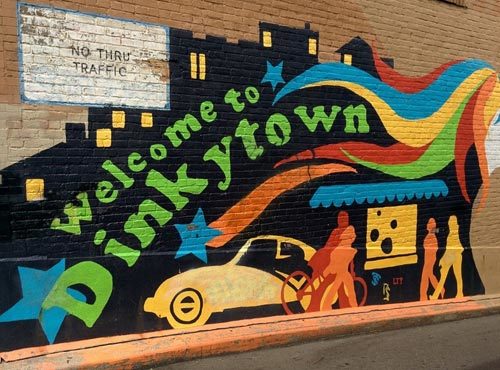
This was where Eduardo lived. His apartment, which he had all to himself, was roomy and new, with shiny kitchen appliances, only slightly stained beige shag carpet, and plenty of heat. In the living room a ratty couch faced a littered coffee table; across the room sitting on shelves made of boards and bricks was the biggest, most complicated stereo system I had ever seen, and hundreds of vinyl records. I drooled a little.
Bob Marley crooned sweetly from out of the chest-high speakers, beers were cracked, joints were lit, and I felt a physical loosening in my chest and shoulders, which reminded me I needed to review the names of the bones in the human body for my physical anthropology class the next morning. One beer and I would go home. Maybe two.
Eduardo sat unnecessarily close to me, our hips touching, and in his charming accent said, “I apologize for my poor furnishings.” His father gave him a generous monthly allowance, which he preferred to spend on beer and pot and albums, rather than bookshelves (or books: I didn’t see a single one).
Eduardo’s family had managed to flee from Castro with quite a bit of their money. Although not nearly enough of it according to Eduardo, who held me captive for several more beers that night with his fascinating if slightly biased history of the Cuban Revolution as seen through the eyes of the very people who inspired Castro and Che to reach for their revolvers. Mindy and Patti, who had heard this tale countless times before, indulged in Pracna gossip till they passed out. Way too late, I finally thanked Eduardo and stumbled home through three-foot snowdrifts, thinking, well that was fun, I needed that, all work and no play and who wants to be dull? I promised myself once was enough, I wouldn’t make it a habit.
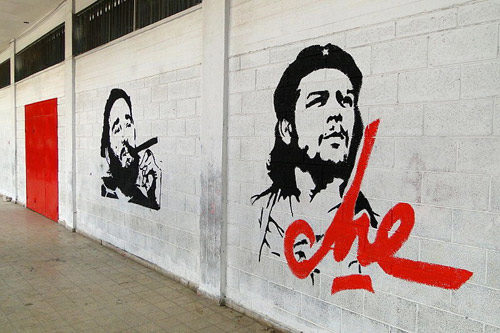
I ended up at Eduardo’s apartment the next night and the one after that.
Mindy, Patti, and Eduardo should have been a cautionary tale for me. All three of them were on academic probation after spending most of the fall semester listening to Bob Marley and smoking weed. Mindy was the only one who seemed concerned, but the textbooks she lugged to work and then to Eduardo’s and then back home remained uncracked. At least she bought books. Eduardo had better things to do with his money, keeping the four of us in Grain Belt beers and pot.
Eduardo wasn’t worried about being on probation. His family had just parked him at the University of Minnesota until he was old enough to join their mysterious business. If he flunked out, they would find a place for him at a college in Mexico or Spain, one that didn’t care about a transcript. Patti had decided that as the future Señora Eduardo, she didn’t need a college education either and rarely went to any of the three classes she had registered for.
Somehow I managed to keep my grades above water while doing what most 20-year-old college kids did then and still do: get shit-faced every single night. I just didn’t sleep much. I’d make it back to my dingy apartment and my disapproving roommate Liz in the morning in time to shower and change before trudging through the snow to my eight o’clock class. I told myself that as long as I never missed a class, I was fine. And I wasn’t spending my hard-earned money at an after hours club; I was just hanging out, in a warm place with very attractive people, while three little birds assured me that everything was going to be all right.
Eduardo was delighted to add a blonde to his collection; he was always stroking my hair, resting his hand on my thigh, holding a joint to my lips. I didn’t take it seriously, as Eduardo flirted with Mindy and all the other Pracna waitresses. Then one night, when my brain had punched out for the evening and Patti and Mindy had fallen asleep on the couch to the lullaby of “No Woman No Cry,” the handsome Eduardo took me by the hand and led me into his bedroom. The sex, even in my stoned and drunken state, was unremarkable, and I regretted it well before Eduardo rolled off of me and started snoring.
I have no excuse for my awful behavior outside of callow, stupid youth. I had broken the girlfriend code. I confessed to Patti the next day, as we were changing into our uniforms at work. I steeled myself for tears and yelling and the mass disapproval of the entire Pracna waitstaff, which thrived on gossip. What if I had to quit my job? Guilt and dread gripped my head and stomach in a vise but Patti shrugged it off as if I had done nothing worse than help myself to a beer from Eduardo’s fridge. She had absorbed enough of the Latin male mindset to know not to make a fuss about such a thing; she had her eye on the prize. Patti did ask me not to tell her best friend Mindy, and made sure that I never had another opportunity to be alone with Eduardo.
I was relieved and grateful that I had not been banished from Eduardo’s. I had grown to hate my charmless, chilly duplex. Liz and I lived directly above our witchy, man-hating landlady, who thundered up the stairs with her own key the moment she heard anything “suspicious,” threatening that if a boy as much as set foot on our front stoop Liz and I would be tossed out on the street where we belonged.
A brand new apartment with a cute shiny alcove kitchen in an elevator building with plenty of heat was all I needed of luxury, even though there was barely a stick of furniture besides the rumpled couch suffering from cigarette burns and many spilled drinks and that massive stereo system; in the bedroom a double mattress rested on the floor, with sheets that looked like they had never been changed, even after my escapade with Eduardo.
My drunken, stoned nights at Eduardo’s lifted me off the treadmill of work and school and the awfulness of trudging to both through the sleet, snow, and freezing temperatures of a Minnesota winter, a winter that set records in how high the drifts were and how low the thermometer plunged. Those three little birds had obviously never been through February in Minnesota.
I had thrown myself back into my hectic work schedule, taking as many shifts at Pracna as I could, closing up Saturday nights and ten hours later cheerfully serving Bloody Marys to people who worshiped at a bar. The church people arrived at one, still dressed in their Sunday best and ready for the weekend’s last bender.
Winter drives Minnesotans to drink, to search out the warmth of bars and other people, and Pracna, with the golden glow of its oak bar, polished by generations of elbows, profusion of fake Tiffany lamps bestowing flattering spots of color, and attractive and professionally friendly waitresses, was constantly packed. My shoebox stash was replenished and continued to grow, as fast as if the one dollar bills in there were mating and reproducing.
One snowy sub-zero day I was counting up my money like Scrooge McDuck and remembering that a year ago I was living on off-brand fish sticks and instant ice tea to scrape together the cash for a one-way plane ticket so I could spend six days in an old folks home in Daytona Beach.
Now my junior year Spring Break was coming up, and I was awash in dollar bills. I could go on a vacation that did not involve rooming houses or hitchhiking. My pal Liz had not mentioned any Spring Break plans of her own; we had gone our separate ways, passing at odd hours through our shared apartment, occasionally backing out of the already occupied bathroom, or silently sipping instant coffee in the morning. Patti was going to Florida with Eduardo to meet la familia. That left Mindy, who was dying to get away for a week somewhere your snot didn’t freeze the second you stepped outside, where you could wear sandals and a bikini, drink piña coladas, and meet boys. That sounded good to me too.
Mindy brought me brochures from a student travel company that offered Spring Break trips to Montego Bay or Acapulco, $299 for airfare and hotel. I voted for Jamaica. I had spent months listening to Bob Marley while smoking weed at Eduardo’s; I looked at the photo of a white sand beach and calm turquoise sea and pictured myself right there with a big blunt and a handsome Rastaman. But another Pracna waitress told Mindy that the beaches in Jamaica were overrun with packs of ferocious, tourist-eating dogs. Mindy was terrified of dogs; even my mother’s miniature poodle Shay-Shay would have sent her scrambling up a palm tree. So instead we flew off to Mexico on a chartered flight, packed with students who couldn’t wait to start drinking to wretched excess. Mindy and I navigated the flight and the bus to the hotel with only minor pawing and mauling from male Spring Breakers.
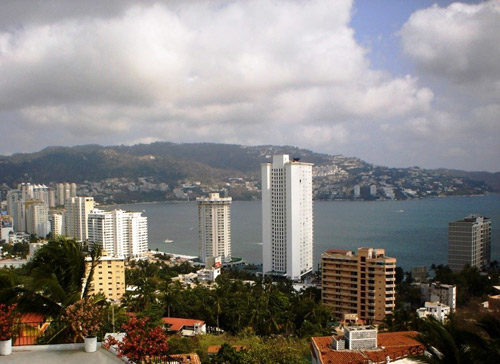
The bus disgorged us under a torn awning attached to a three-story, mildewy green building. Mindy and I stood on the sidewalk in the noon Acapulco heat, looked at the hotel and looked at each other. In no way did this hotel resemble the one in the brochure except for the name, which was La Casa Cheapo, or something similar. The sullen, non-English-speaking guy at the front desk glanced at our reservations and tossed us a big metal key attached to a heavy weight etched with our room number. The elevator doors opened to release a toxic combination of stinks and a pack of boys too hung over to even leer at the new meat. Our room did not overlook the famous Acapulco beach, but the busy, noisy Avenida Costera. The air conditioner, thick with dust, refused to work; when we opened the one tiny window clouds of car exhaust were sucked into our room. There was a urinal cake perched on top of the toilet. After emptying the drawers of roaches, we unpacked, put on our cute bikinis, and headed down to the pool, which looked like pea soup: a clot of vomit floated in one corner and two broken patio chairs in another. Mindy was about to cry. I was mentally comparing this dump to the luxury hotel my family had stayed at during a dental convention, and I snapped to a decision: “We’re going to the El Presidente.”
We rushed down the Avenida Costera to the El Presidente pool, which was exactly as I had remembered it from that trip, eight years before, the scene of so many drunken dental hijinks. Shiny sea blue tiles surrounded a huge, sparkling pool, with that eighth wonder of the world, a swim up bar. On all four sides of the pool area Tiki huts were serving oversized margaritas, frosty Sol beers, and drinks in coconuts. Rows and rows of lounge chairs held dozens of college students, boys and girls in various shades of Spring Break, from the just-arrived paper whites, to the should-have-gotten-out-of-the-sun crimsons, with a few lucky souls who can get a tan in seven days scattered about. Prominently displayed above this wonderland was a sign FOR GUESTS OF THE EL PRESIDENTE ONLY.
Mindy said, “If I have to go back to that hotel, I’m going home.” We agreed to live dangerously; if we had to, we could just spend the day getting thrown out of different hotel pools. We found two free lounge chairs and tried to look as if we belonged there.
Mindy and I were busy rubbing Coppertone on each other when two shadows fell over us. I looked up to see what was keeping the sun from bestowing some kind of glow to my pasty Nordic skin. There stood two Mexican guys, fully dressed in billowing shirts and tight pants. One looked like a younger, pudgier Cantinflas, smiley and slightly goofy. The other could have Eduardo’s taller, better-looking, older brother. He had dark brown, shoulder-length wavy hair and eyelashes longer and thicker than any offered by Maybelline; his gleaming white shirt gaped open to reveal a deeply tanned, muscular chest adorned with a thick gold chain and dangling charms: a small clenched fist in ivory, a blue eye, a half-dollar sized gold medallion. The guys asked if we wanted a drink (“Why yes, thank you!”) and introduced themselves. The tall one was Fito Giron—didn’t we recognize the famous singer? We had to have seen Fito’s poster in the hotel lobby! Fito was the star of the show at the El Presidente lounge; the other guy, the one who was doing all the talking, was Jorge, Fito’s full-time gofer and friend.
Rum and coconut drinks magically appeared and Fito scribbled on the bill offered by a fawning waiter. Mindy and I thanked Fito for our cocktails and apologized to Jorge for our ignorance. No, we hadn’t seen Fito’s act, we had only gotten to town that day. While Fito posed, hands on hips, chin cocked, hair tilted into the wind, Jorge insisted that we had to go that night to hear Fito. He, Jorge, would put us on the guest list. What were our names and room numbers?
Ten minutes trespassing and we were busted. We confessed that we weren’t staying at El Presidente but down the Avenida at the no-star hotel des estudiantes. This was shrugged off by Fito. “No importa,” he said as he looked down and locked eyes with me. Jorge was quick to jump in. “Don’t worry, your names will be on the list, you see Fito’s show and then we all go dancing!” Jorge wrote down our names, and Fito swooped down on me like a hawk to plant a kiss on both cheeks, then turned and left with a backward wave.
I was bewildered and amazed and giddy at what had just happened. We had landed dates in our first hour of Spring Break, we had free drinks in our hands, and we had successfully snuck into the El Presidente pool. To be sure that we were not at risk of getting the bum’s rush, we called over the waiter for more coconut rum drinks; he scurried over like a Mexican Groucho Marx, took our order, and let us know that everything was on Fito’s bill.
North Country Girl: Chapter 36 — Pracna on Main
For more about Gay Haubner’s life in the North Country, read the other chapters in her serialized memoir.
I started my junior year at the University of Minnesota in Minneapolis broker than ever and carrying a ridiculous load of demanding classes, classes that had not yet been paid for, as I was informed by the bursar’s office the first day of school.
I picked up our apartment’s newly installed phone and dialed my dad, resentful that I was going to have to pay for the long distance call.
“Hi Dad. Um, you know, the college hasn’t gotten my fall tuition yet.”
“Yeah, okay. I’ll guess I’ll send a check. But you need to change your major to nursing. That’s the only thing that makes sense. You’ll meet doctors.”
“Dad, I’m not going to college so I can marry a doctor.”
“Well, you’ll marry someone.”
My dad believed that the sole purpose any girl had for going to college was to find a husband. Even if I were unlucky enough to marry someone not in the medical profession, I could put a nursing degree to use tending my own kids through bouts of the stomach flu, pinworm infestations, and earaches.
I hung up, slightly sick to my stomach at this image he had put in my mind, of myself in curlers and an apron, applying a Bugs Bunny Band-Aid to a small disembodied knee.
Every hippie cell of my body revolted at a future as a housewife. I was going to travel to exotic places, have adventures, meet interesting men, and have someone pay me to do it. I could be an airline stewardess, basically a flying waitress, or I could be Margaret Mead and study fascinating sexual mores in tropical climes. I was not about to change my major from Anthropology to Nursing.
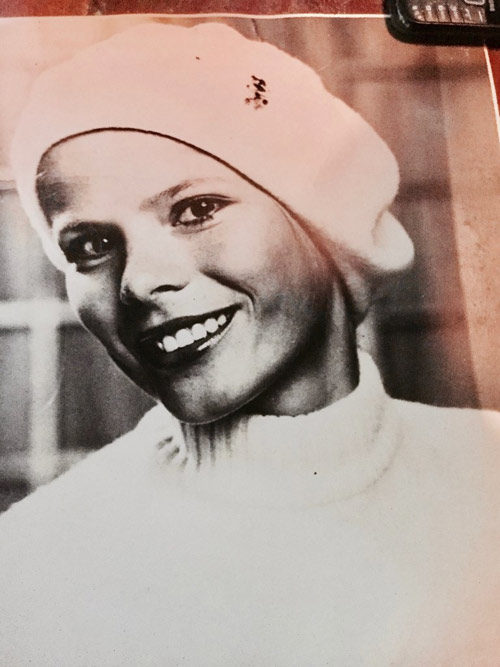
Every day after classes I checked the mailbox, which remained empty, except for letters from the University informing me that my fall tuition, $222, had not yet been paid.
I called Colorado, placing a person-to-person collect call to my mother’s dog, who I knew would not accept the call. A few seconds later, my mother called back.
“If I could help you I would. Your father is months behind on alimony. I’ll put a twenty in the mail.”
I went to talk to the bursar, a nice man who was sympathetic but could not really do anything for me. My teary eyes and pathetic sniffling won me a slight extension, but if tuition in full was not forthcoming, I would soon be an ex-coed.
Math was never my best subject, but a quick calculation showed that if I went back to the denim hell of Lancers, at $2.50 an hour, even if I gave up my sanity-preserving White Russian nightcaps and lived on carrot sticks, I would still have to work sixty hours a week to pay for tuition, rent, and books. Which would have been impossible anyway, as the store closed at seven and all day Sunday, not to mention leaving no time for class.
The Minnesota state legislature saved me. Ever since Wisconsin lowered its drinking age, hundreds of Minnesotan nineteen- and twenty-year-olds had smashed up their cars driving home drunk from the state line bars in Hudson and Superior and La Crosse. My on-and-off boyfriend Steve had driven me over to Wisconsin once; I decided that the pleasure of legally drinking in a bar did not make up for the hour of white-knuckled terror spent in a convoy of cars that swerved back and forth across the yellow lines, driven by cross-eyed drunk kids at two in the morning.
Between the desire to keep a generation of kids from killing themselves driving drunk across the state line and the appeal of the extra tax revenue, Minnesota saw the light and passed a law that nineteen year-olds could buy alcohol. And they could also serve it, which meant that instead of folding jeans or dishing out dormitory casserole I could work in a real restaurant, one that served cocktails before, with, and after dinner, and where tips would be folding money, not shiny quarters.
I applied for a waitress job at Henrici’s Steak House, famous for huge hunks of meat, oversized martinis, and according to my friend Sarah who worked there, big tipper businessmen. I was hired immediately and fired almost as quickly. It was a struggle to be my usual perky, overly friendly waitress self because I was so miserably uncomfortable in my Henrici uniform. I looked like a cross between a Playboy Bunny and a French maid from a Pink Panther movie. Starchy, scratchy white crinolines propped up my butt-length black satin skirt, and there was a wide gap between my lace-trimmed strapless top and my actual chest.
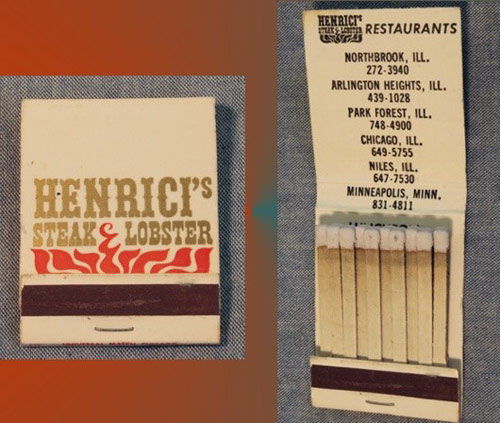
I blame that uniform for the fact that my steel trap of a mind could not memorize the mandatory script parroted by Henrici’s waitresses. I knew the dynasties of Egypt, the periodic table of the elements, and every state capitol, but I could not remember to greet people with “Welcome to Henrici’s Steak House, home of the twenty-four ounce filet!” While waiting on my first and last table of customers, I blanked out the entire script, pouring glasses of water, handing out menus, and taking drink orders as silently as Marcel Marceau while the manager glared at me. I finally recalled a single line, shouting out “Here is your piping hot loaf of freshly baked Henrici’s sourdough bread!” to my astonished customers. When I bent over to deliver the steaming loaf a big wad of Kleenex fell out of the top of my dress into the butter. The manager, steaming like a loaf of sourdough, ordered me to turn in my uniform and never come back. The time I had spent training was not on the clock and so I earned exactly nothing for three days’ work.
Waiting for me at home after this debacle was a final warning letter from the bursar, and of course, no check from my dad. I was flat broke. I should have stolen a loaf of bread from Henrici’s, like Jean Valjean.
I wept to my roommate Liz that I had no money and now no job. Liz, like the Minnesota state legislature, saved me.
“Listen, I just heard about a new restaurant opening. They’re looking for waitresses and it’s really close to campus.”
I dried my tears, reapplied my lipstick, hopped on my bike, and rode down to Pracna on Main.
As long as I could remember, when you went out to dinner in Minnesota you went to a “nice” restaurant, with white table clothes, a cut glass dish of celery and carrot sticks and olives set before you, a place where dinner came with a cup of soup du jour or tomato juice as a starter, and hash browns or French fries or baked potato as a side—a place like Henrici’s. Pracna on Main was unlike any other restaurant I had been to. You didn’t go to Pracna to eat a steak, you went there to have fun.
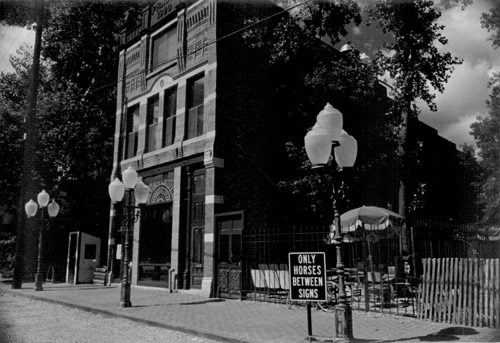
Pracna was an old speakeasy in the warehouse area near the Mississippi River that had been shuttered for years. The original bar had survived, a splendid carved oak specimen fully twenty feet long that was constantly filled with happy drinkers, who started with Bloody Marys and beer backs at eleven in the morning, and partied on until one a.m., when the bartenders told them, “You don’t have to go home, but you can’t stay here.” (Closing was midnight on Sundays; I guess people were tuckered out from church-going.)

Click to Enlarge
There were a handful of tables on an outdoor patio, where people pushed and shoved and acted in a definitely not Minnesota nice way to grab during the few months a year you could drink outside without a parka. Inside, the cocktail area filled up at five with hundreds of people waiting for a table: college students with money, sharp-eyed singles, couples on first dates, lovers who would wait even longer to score one of the two booths with curtains you could close and canoodle behind, young marrieds trying to recapture some fun in their lives. People waited for hours to eat, throwing back gin and tonics and seven and sevens and Harvey Wallbangers, while a vintage juke box blasted rock and roll at a level never heard before in a Minneapolis restaurant. Decades later, every time I hear “Crocodile Rock” I paste a cheery, welcoming, fun smile on my face and reach for my long-gone order pad.
No one went to Pracna for the food. There was a steak, a cheeseburger, chili, and maybe three other entrees, amusingly served on paper plates and bowls that were just sturdy enough to not collapse if you got them to the table quickly. There was an enticing selection of after dinner drinks—grasshoppers, pink ladies, golden cadillacs—but just one dessert: maple nut ice cream with caramel sauce and Beer Nuts, topped with whipped cream and a cherry, and which thankfully did not come in a paper bowl, but in a real sundae glass.
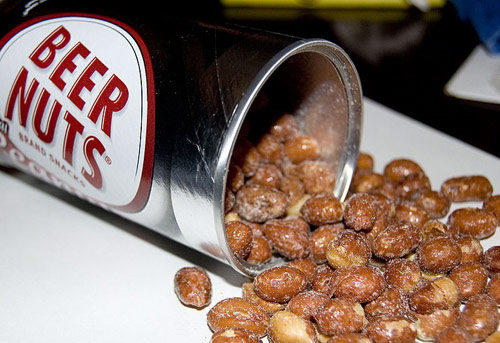
And in an era when grocery stores shut their doors at seven, Pracna served food till eleven o’clock at night. This was exhausting for the waitresses, but brilliant: the folks who were really drunk sobered up a bit over a bowl of chili and then, in true Minnesota style, went back to drinking.
The casually dressed wait staff, mostly cheerful U of M girls and a few cute guys, glowed with youth and good looks. There were a handful of older but still pretty veteran waitresses from fancier joints who were all gob-smacked that they were making so much money serving cheeseburgers on paper plates.
I showed up, filled out an application, was hired on the spot, and headed off to Donaldson’s department store to purchase my uniform: a couple of button down brown-checked gingham shirts to be worn with blue jeans. The gravel-voiced, craggy, alky manager who hired me said, “Make sure to wear your tightest jeans and most comfortable shoes.”
I signed up to work every possible shift at Pracna. In two weeks I had paid my past-due tuition, next month’s rent, and had $600 in one dollar bills stashed in a shoebox under my bed. And I had fun new friends, the other Pracna waitresses. At the one o’clock closing, after we had gently guided the last drunk customers out the door, gleefully counted up our tips, and paid off the bartenders and busboys, they always invited me along to a spot that was illegally serving drinks.
An after-hours bar sounded exotically illicit, a place to meet really, really bad boys. I was dying to go to one of these dens of iniquity, especially under the wings of my new friends. After spending the night perfectly remembering everyone’s cocktail order and making sure they always had a fresh one in front of them, rushing bowls of hot chili to tables before they started to leak all over my hands, and making those stupid sundaes, there was nothing I wanted more than to park my ass on a barstool and have someone bring me a drink.
But I always shook my head, thanked them, and headed off on my bike down the quiet autumn streets to my apartment, where I made myself a White Russian and tried to read at least one chapter of a text book before grasping a few hours of sleep, sleep that was interrupted by nightmares of being tossed out of college for not paying my tuition or of being surrounded by crying toddlers with bloody knees.
I knew a slippery slope when I saw one, and I knew that I was exactly the kind of person who would roll down that slope at warp speed. One late night out would be so much fun that soon it would be three or four, and then there would be missed morning classes and crappy, half-assed lab reports and essays, and no chance of getting the grades that would lead to graduate school and eventually to a career quizzing Maori teens about their sex lives, digging around in the dirt for artifacts, and hanging out with Kalahari bushmen. I was grateful for my job at Pracna, but if I did not want to spend my life with aching feet and hands that smelled like ketchup, I had to keep my pert nose clean and to the grindstone.
My life dwindled down to work and college. The letters from the bursar had frightened the bejesus out of me and the lack of response from my father made me realize that at nineteen, I was on my own. I comforted myself by peering into my overflowing shoebox and stroking my Kansas City roll: here was next month’s rent, next semester’s tuition. If I worked hard enough I would never again need to cry and beg on the phone with my father (not that it had done any good), or have to guilt-trip my mom into putting a twenty-dollar bill in the mail.
Every minute I wasn’t at work or in class I spent studying. As much as I liked them, I didn’t want to end up one of the thirty-year-old career waitresses, who already had faces as hard as their shellacked beehives, who smoked Virginia Slims in the changing room as they bemusedly counted up their tips.
So I said no to my hard-partying co-workers, no to Liz when she invited me to frat keggers, no even to invitations for a night of debauchery from Steve, who was still dealing drugs out of his dorm room. I couldn’t go out. I had translations due in French poetry the next morning. I had to find someone to help me make sense of my scribbled notes from organic chemistry that I may have being trying to read upside down. I had chapters in astronomy to read before I could peer through the University’s Tate telescope and get lost in the stars. I sighed in wonder at the canals of Mars, the rings of Saturn, the Horsehead Nebula, all looking exactly like the lurid illustrations from old sci-fi paperbacks, and pondered if I should change my major to the next one in the alphabet.
And best and worst, at eight o’clock in the morning, three days a week, I had to look as if I actually knew what was going on at a graduate seminar on pre-Columbian culture in North America that I had talked my way into. Professor Pearson, eminent in her field and impeccable in her tailored suits, elegant silver topknot, and pink polished fingernails, looked as if she spent her life playing bridge, not digging about in an ancient midden. I had a girl crush on her, and in class had to guard against falling into a daydream of the two of us on a windswept Arizona plateau, fooling around with trowels and dusting off pottery shards.
Unfortunately, the seminar did not just consist of me and nine MA candidates sitting around a table jawing about digging sticks and the earliest possible crossing of the Bering Strait; that was the fun part. Halfway through the semester Professor Pearson made us learn flint knapping. I was as successful at flint knapping as I was sewing invisible hems back in seventh grade home ec. Professor Pearson would cast her chilly blue eyes over my clumsy stone arrowheads and spear points, ignoring the deep and bloody cuts on my hands from flying flakes of rock, point out invisible-to-me flaws with a pink-tipped finger, and hand me another stone core to work on. Flint knapping killed our imaginary romance.
It was hard enough juggling drinks and overloaded paper plates with hands that looked as if they had been in a fight with a cat over a chainsaw; I cursed Professor Pearson through gritted teeth every time I had to dig down into the always half-empty vat of maple nut ice cream to make Pracna’s one and only dessert, trying not to scrape my hand on the crystal-sharded sides and carefully checking the scoops to make sure they were not streaked with blood. God, I hated those sundaes and did everything I could to discourage people from ordering them, even though they added another $1.49 to the tab. To this day, I cannot bear the sight of a can of Beer Nuts.